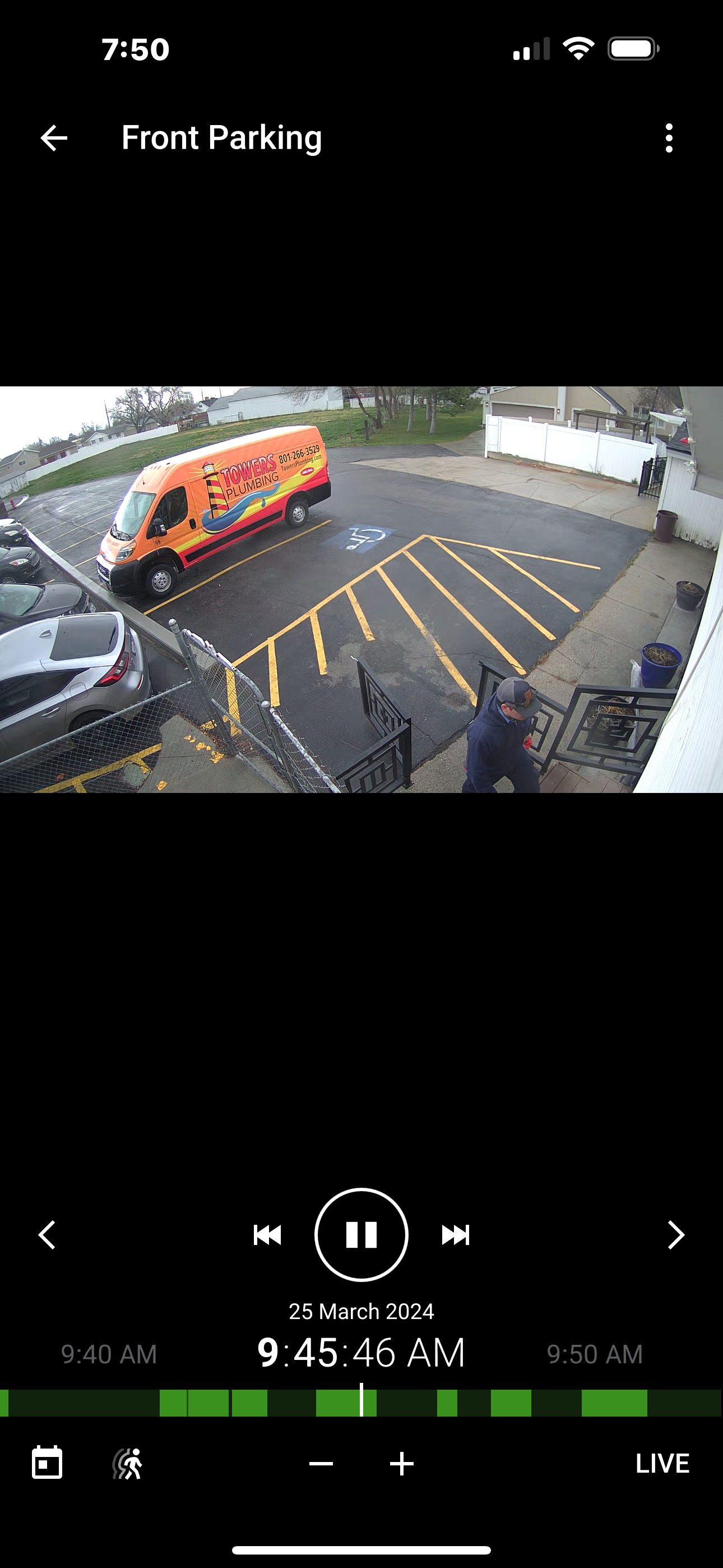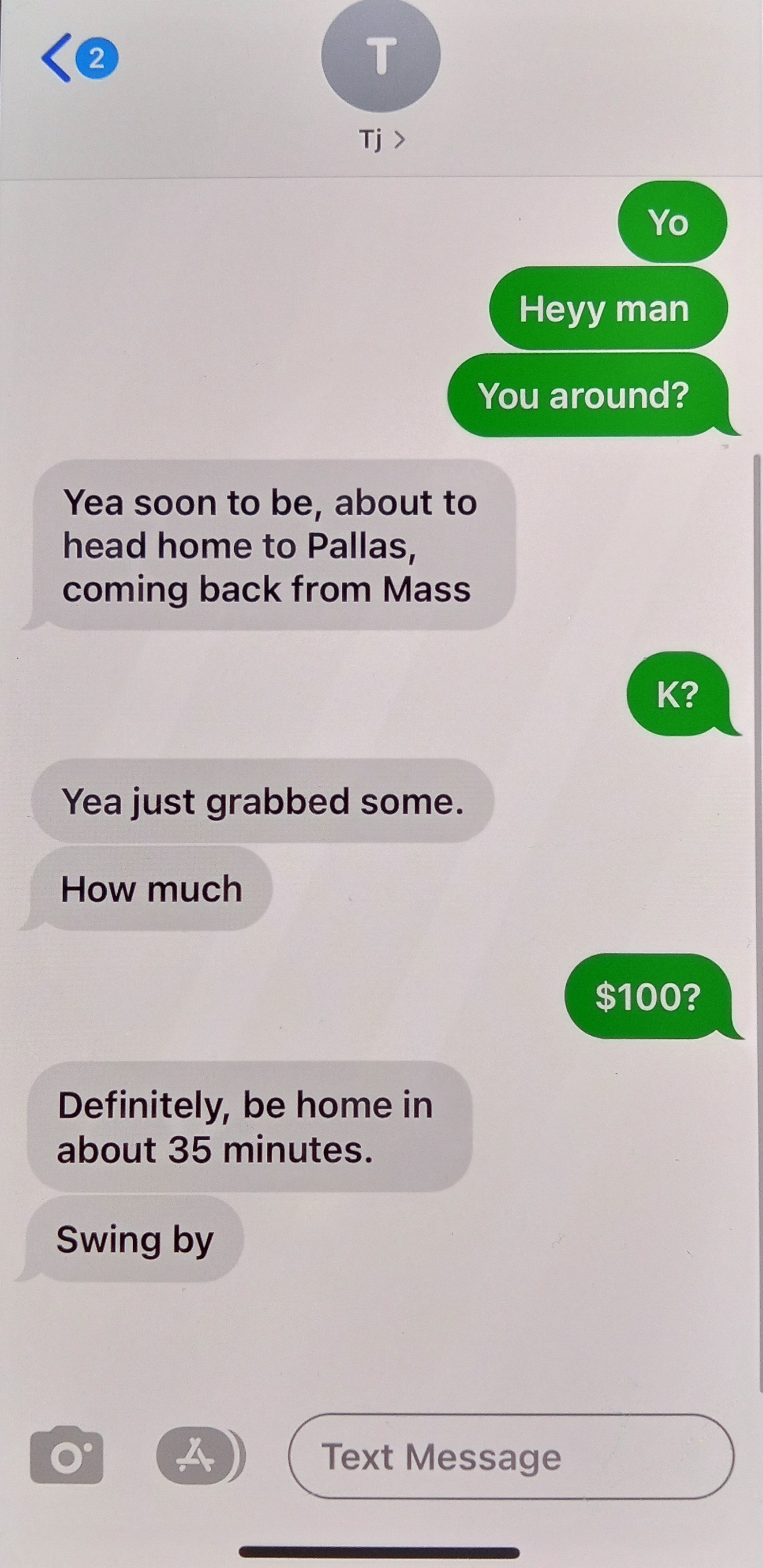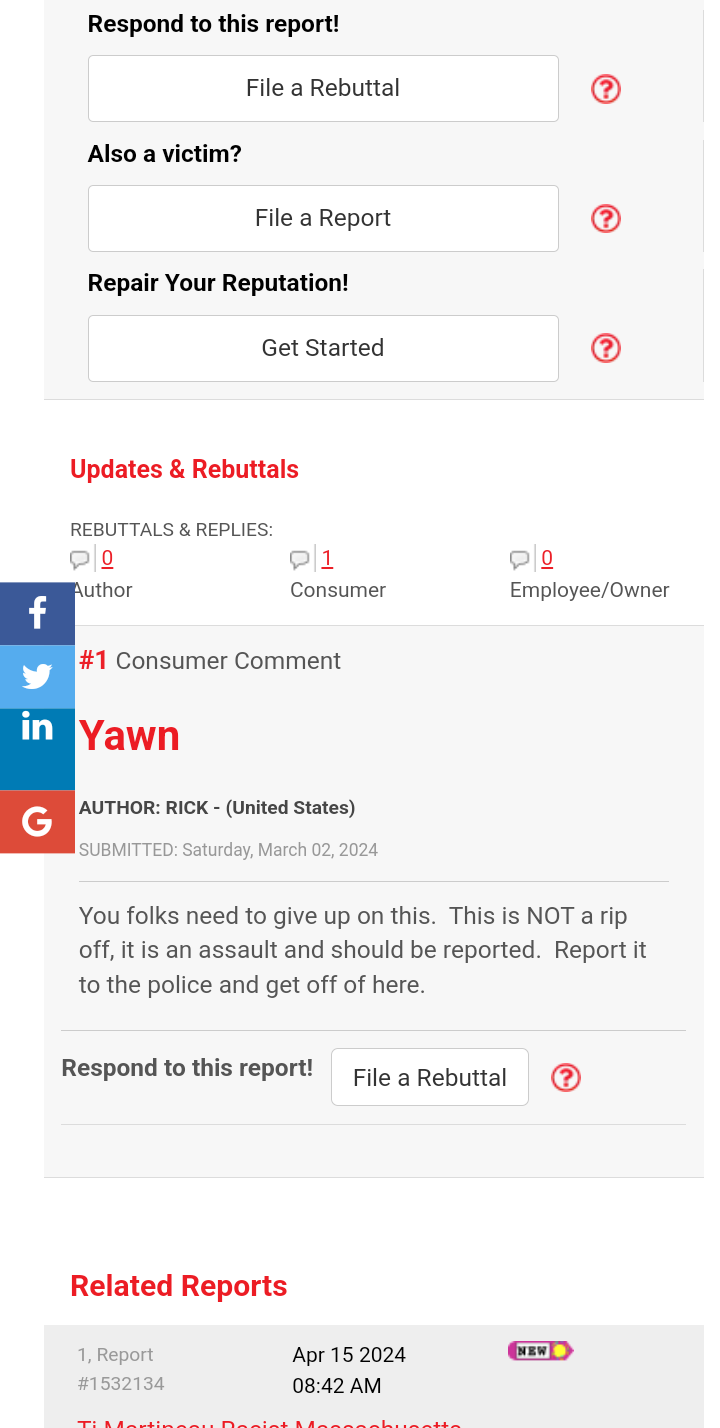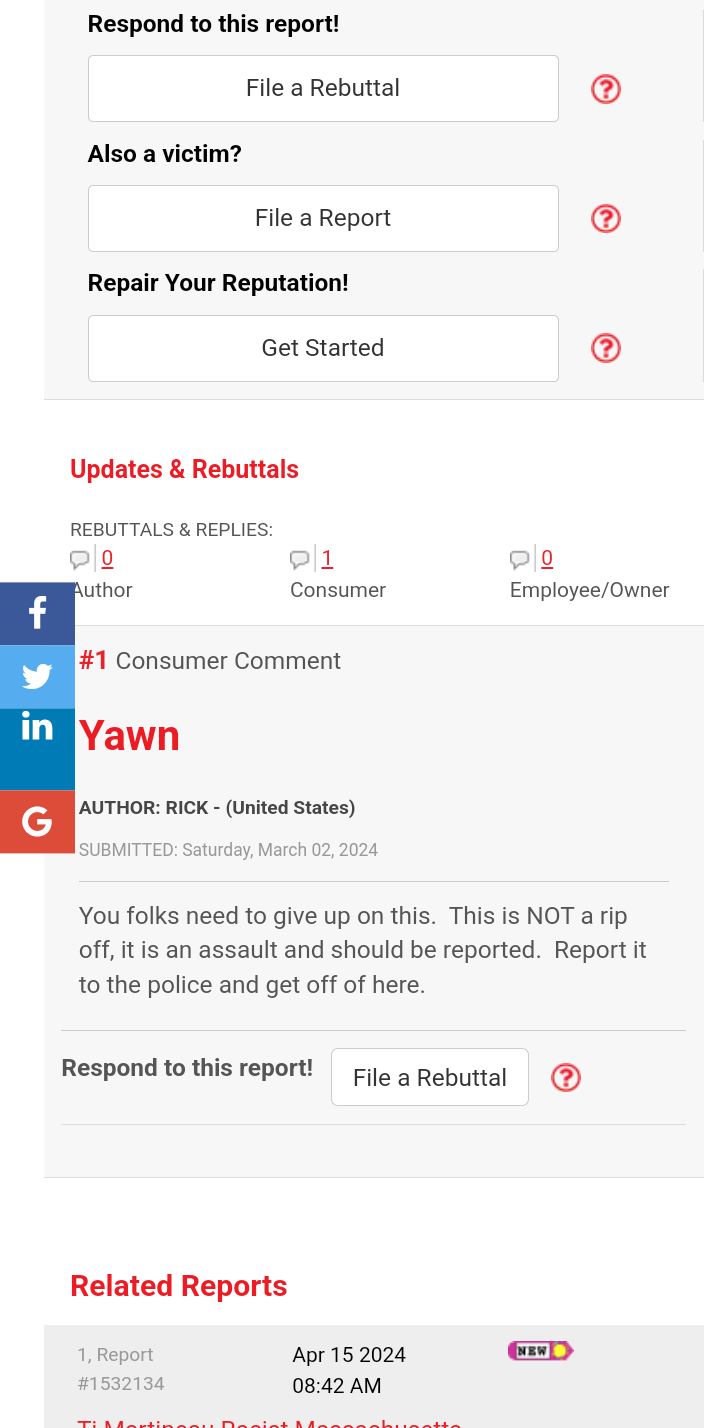- Report: #492488
Complaint Review: NARS - National Assets Recovery System - Cape Girardeau Missouri
NARS - National Assets Recovery System NARS Constant calling at work even when they have been asked to stop. Even when I have no idea what they are talking about Cape Girardeau, Missouri
I have been constantly called by Nelson from Nars. The first phone call he told me what he was calling about Cross Country Bank , I said "huh" and he said some Applied Bank, i again said "huh" i have no clue what you are talking about. He then started asking me questions about credit cards, and I made the stupid mistake and told him the only credit cards I knew about was my First Premier, and he goes, oh yeah that one, but he had already said something about Cross Country Bank. AND I had closed my Firs Premier bank cards a few years ago. ANyway, I told him that i would have to look into my credit report and find out what the heck he was talking about. He then called me back after I did NOT return his phone calls. He was demanding me to pull out my check book and write him a check for $1100. I told him NO way am I going to pay for something that I didn't open up. I did file a Fraud alert on my credit report. I called the bank in question and they told me that the COULD NOT tell me the address in which the credit card was sent to when it was opened, only that the card was applied for online. OH GREAT online credit card but they can't tell me where it was opened up. They said that I woudl have to call the collection agency that has the debt. Well NARS will NOT tell you anything until you actually give them money. I am NOT going to pay for somehting that i am NOT responsbile for. I did tell Nelson that he could no longer call me at work and I also changed my cell phone number becuase he kept calling the cell phone at all hours of the night. He told me that since it was the only number he could call me at he was going to. I told him that there are laws in the state of Texas that protect me from the harrassing phone calls and i asked to speak to his supervisor. After being on hold for ten minutes the call was disconnected. I figurd they had knew I know my rights, and he woudl stop calling.. OH NO here come the calls again. Thank god for Caller ID at work becuase when NARS does call I just do not answer the phone. Just last week he called i ignored it and then he called right back so I told my friend to answer the phone and tell them that i no longer work there, and he asked for my forwarding information. Does this retard actually think that a new employee is going to give someone that calls personal information about an employee, that WOULD be BREAKING DOL laws for releasing personal information to 3rd party people. ANyway, I did some research and even on my credit report shows some addresses that I have never even heard of so that tells me that this card was opened by means of Fraud. I have also found where reports can be filed with the Federal Trade Commission that will protect me from these people. They lie to people to get them to pay and often use scare tactics to feel they "WON" when in fact they are the loosers. Its crazy what they are doing to people. Calling them at their places of employement and its not just once a week its like 12 to 20 times a day. The law states that collection agencies cannot contact you at your place of employement its against the law. >Chances are if everyone files a class action lawsuit against NARS they will have to pay us MORE than what they are trying to collect. .I actually am speaking with an attorney on Friday to see options of what else to do.. BUT CONSUMERS BEWARE, with todays Economy dropping like it is, credit card companies and banks screwing themselves, anything can happen.. Keep close eye on credit reports, and often check them with credit bureaus. Even if you ahve to pay for it, simply go fill out an application for credit just to get denied, and this will allow you a free copy of your credit report.
Enough said, i am so angry at NARS for illegal collection debt practices.
1 Updates & Rebuttals
Laurie
Haslet,Texas,
U.S.A.
DEAL WITH CORRECTLY OR NOT AT ALL
#2
Thu, September 10, 2009
You claim to know that TX has laws to protect consumer - but it does not look like YOU HAVE DONE ANYTHING TO HANDLE IT CORRECTLY! If you do not do WHAT YOU ARE SUPPOSED TO DO, and they try to sue you - your defense will be sorely lacking! To Stop calls - YOU have to send them a cease communication letter - certified mail return receipt (proof it was received) You tell them to cease calls and only communicate in writing. Once they receive the letter, you must log all calls received, date time, who called etc. If you know about TX law as you claim - then you SHOULD KNOW that you can record these calls without telling them you are doing so! And can get all their FDCPA violations on tape! Again - FDCPA laws - that you claim to know -NARS is required to send you DEBT VALIDATION in writing within 5 days of first contact. You have the RIGHT to Dispute - BUT YOU HAVE TO DO IT IN WRITING! Again certified mail return receipt. So instead of spouting off about the LAWS you claim to know about- USE THEM TO HELP YOU WITH THIS ISSUE! read dealing with debt collectors and do what it says! Bud Hibbs is local to TX and specializes in exposing illegal debt collection practices. Debt Collectors DO NOT WANT YOU TO KNOW THIS INFORMATION! The INFORMED CONSUMER IS THE DEBT COLLECTORS WORST ENEMY! Dealing with Debt Collectors http://www.budhibbs.com/start.html Statute of Limitations by State always double check YOUR OWN STATE Government Website http://www.budhibbs.com/statute_of_limitations.htm Recording calls from Debt Collectors - always double check YOUR OWN STATE Government Website http://www.budhibbs.com/record.htm From Federal Trade Commission Website FAIR DEBT COLLECTION PRACTICES ACT Debt Collection FAQs: A Guide for Consumers If youre behind in paying your bills, or a creditors records mistakenly make it appear that you are, a debt collector may be contacting you. The Federal Trade Commission (FTC), the nations consumer protection agency, enforces the Fair Debt Collection Practices Act (FDCPA), which prohibits debt collectors from using abusive, unfair, or deceptive practices to collect from you. Under the FDCPA, a debt collector is someone who regularly collects debts owed to others. This includes collection agencies, lawyers who collect debts on a regular basis, and companies that buy delinquent debts and then try to collect them. Here are some questions and answers about your rights under the Act. What types of debts are covered? The Act covers personal, family, and household debts, including money you owe on a personal credit card account, an auto loan, a medical bill, and your mortgage. The FDCPA doesnt cover debts you incurred to run a business. Can a debt collector contact me any time or any place? No. A debt collector may not contact you at inconvenient times or places, such as before 8 in the morning or after 9 at night, unless you agree to it. And collectors may not contact you at work if theyre told (orally or in writing) that youre not allowed to get calls there. How can I stop a debt collector from contacting me? If a collector contacts you about a debt, you may want to talk to them at least once to see if you can resolve the matter even if you dont think you owe the debt, cant repay it immediately, or think that the collector is contacting you by mistake. If you decide after contacting the debt collector that you dont want the collector to contact you again, tell the collector in writing to stop contacting you. Heres how to do that: Make a copy of your letter. Send the original by certified mail, and pay for a return receipt so youll be able to document what the collector received. Once the collector receives your letter, they may not contact you again, with two exceptions: a collector can contact you to tell you there will be no further contact or to let you know that they or the creditor intend to take a specific action, like filing a lawsuit. Sending such a letter to a debt collector you owe money to does not get rid of the debt, but it should stop the contact. The creditor or the debt collector still can sue you to collect the debt. Can a debt collector contact anyone else about my debt? If an attorney is representing you about the debt, the debt collector must contact the attorney, rather than you. If you dont have an attorney, a collector may contact other people but only to find out your address, your home phone number, and where you work. Collectors usually are prohibited from contacting third parties more than once. Other than to obtain this location information about you, a debt collector generally is not permitted to discuss your debt with anyone other than you, your spouse, or your attorney. What does the debt collector have to tell me about the debt? Every collector must send you a written validation notice telling you how much money you owe within five days after they first contact you. This notice also must include the name of the creditor to whom you owe the money, and how to proceed if you dont think you owe the money. Can a debt collector keep contacting me if I dont think I owe any money? If you send the debt collector a letter stating that you dont owe any or all of the money, or asking for verification of the debt, that collector must stop contacting you. You have to send that letter within 30 days after you receive the validation notice. But a collector can begin contacting you again if it sends you written verification of the debt, like a copy of a bill for the amount you owe. What practices are off limits for debt collectors? Harassment. Debt collectors may not harass, oppress, or abuse you or any third parties they contact. For example, they may not: use threats of violence or harm; publish a list of names of people who refuse to pay their debts (but they can give this information to the credit reporting companies); use obscene or profane language; or repeatedly use the phone to annoy someone. False statements. Debt collectors may not lie when they are trying to collect a debt. For example, they may not: falsely claim that they are attorneys or government representatives; falsely claim that you have committed a crime; falsely represent that they operate or work for a credit reporting company; misrepresent the amount you owe; indicate that papers they send you are legal forms if they arent; or indicate that papers they send to you arent legal forms if they are. Debt collectors also are prohibited from saying that: you will be arrested if you dont pay your debt; theyll seize, garnish, attach, or sell your property or wages unless they are permitted by law to take the action and intend to do so; or legal action will be taken against you, if doing so would be illegal or if they dont intend to take the action. Debt collectors may not: give false credit information about you to anyone, including a credit reporting company; send you anything that looks like an official document from a court or government agency if it isnt; or use a false company name. Unfair practices. Debt collectors may not engage in unfair practices when they try to collect a debt. For example, they may not: try to collect any interest, fee, or other charge on top of the amount you owe unless the contract that created your debt or your state law allows the charge; deposit a post-dated check early; take or threaten to take your property unless it can be done legally; or contact you by postcard. Can I control which debts my payments apply to? Yes. If a debt collector is trying to collect more than one debt from you, the collector must apply any payment you make to the debt you select. Equally important, a debt collector may not apply a payment to a debt you dont think you owe. Can a debt collector garnish my bank account or my wages? If you dont pay a debt, a creditor or its debt collector generally can sue you to collect. If they win, the court will enter a judgment against you. The judgment states the amount of money you owe, and allows the creditor or collector to get a garnishment order against you, directing a third party, like your bank, to turn over funds from your account to pay the debt. Wage garnishment happens when your employer withholds part of your compensation to pay your debts. Your wages usually can be garnished only as the result of a court order. Dont ignore a lawsuit summons. If you do, you lose the opportunity to fight a wage garnishment. Can federal benefits be garnished? Many federal benefits are exempt from garnishment, including: Social Security Benefits Supplemental Security Income (SSI) Benefits Veterans Benefits Civil Service and Federal Retirement and Disability Benefits Service Members Pay Military Annuities and Survivors Benefits Student Assistance Railroad Retirement Benefits Merchant Seamen Wages Longshoremens and Harbor Workers Death and Disability Benefits Foreign Service Retirement and Disability Benefits Compensation for Injury, Death, or Detention of Employees of U.S. Contractors Outside the U.S. Federal Emergency Management Agency Federal Disaster Assistance But federal benefits may be garnished under certain circumstances, including to pay delinquent taxes, alimony, child support, or student loans. Do I have any recourse if I think a debt collector has violated the law? You have the right to sue a collector in a state or federal court within one year from the date the law was violated. If you win, the judge can require the collector to pay you for any damages you can prove you suffered because of the illegal collection practices, like lost wages and medical bills. The judge can require the debt collector to pay you up to $1,000, even if you cant prove that you suffered actual damages. You also can be reimbursed for your attorneys fees and court costs. A group of people also may sue a debt collector as part of a class action lawsuit and recover money for damages up to $500,000, or one percent of the collectors net worth, whichever amount is lower. Even if a debt collector violates the FDCPA in trying to collect a debt, the debt does not go away if you owe it. What should I do if a debt collector sues me? If a debt collector files a lawsuit against you to collect a debt, respond to the lawsuit, either personally or through your lawyer, by the date specified in the court papers to preserve your rights. Where do I report a debt collector for an alleged violation? Report any problems you have with a debt collector to your state Attorney Generals office ( www.naag.org ) and the Federal Trade Commission ( www.ftc.gov ). Many states have their own debt collection laws that are different from the federal Fair Debt Collection Practices Act. Your Attorney Generals office can help you determine your rights under your states law. For More Information To learn more about debt collection and other credit-related issues, visit www.ftc.gov/credit and MyMoney.gov , the U.S. governments portal to financial education. The FTC works for the consumer to prevent fraudulent, deceptive, and unfair business practices in the marketplace and to provide information to help consumers spot, stop, and avoid them. To file a complaint or to get free information on consumer issues , visit ftc.gov or call toll-free, 1-877-FTC-HELP (1-877-382-4357); TTY: 1-866-653-4261. The FTC enters consumer complaints into the Consumer Sentinel Network , a secure online database and investigative tool used by hundreds of civil and criminal law enforcement agencies in the U.S. and abroad. February After YOU HAVE DONE WHAT YOU MUST DO and the harrassment does not stop File complaints with Federal Trade Commission https://www.ftccomplaintassistant.gov/FTC_Wizard.aspx?Lang=en Your State Attorney General State Attorney General is every state they have offices Link to all State Attorney General Websites www.naag.org If you or they are located in NY use this SPECIAL Link www.NYDebtHelp.com This special website was created by NY AG Andrew Cuomo specifically for reporting illegal debt collection practices. HES CRACKING DOWN AND SHUTTING THEM DOWN! Also report your calls and contacts with debt collectors at http://www.budhibbs.com/index.html If the company is listed under agencies report there. If not on the list YET, click on Watchlist! and add to the list. You can also post here http://www.collectorsexposed.com/forum2/index.php?board=2.0























